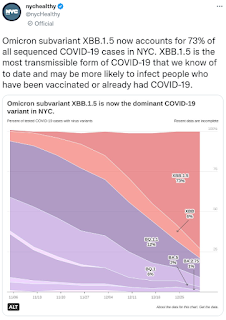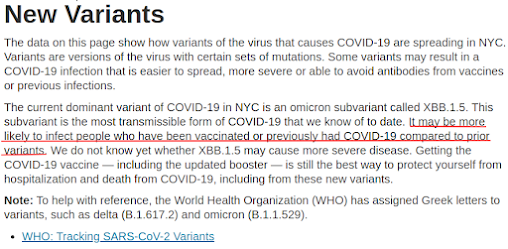#17,236
Pithy tweets, like the one above posted by the @nycHealthy official account 4 days ago, can quickly convey a single, important message that can be read by millions. But, the downside when using this format is, nuance and detail are often lost.
And that is exactly what has happened as anti vaccine activists have echoed this tweet thousands of times over the past 4 days as their `smoking gun'; official `proof' that the COVID vaccines are evil.
Admittedly, this tweet could have been better phrased, as it left out 3 very important words. It read:
Omicron subvariant XBB.1.5 now accounts for 73% of all sequenced COVID-19 cases in NYC. XBB.1.5 is the most transmissible form of COVID-19 that we know of to date and may be more likely to infect people who have been vaccinated or already had COVID-19. . .
The omitted words? ". . . compared to prior variants."
Lazy reporters looking for easy clicks, and those with an anti-vaccine agenda, simply took this tweet as the whole story, and shouted from the rooftops that the vaccine made people more susceptible to infection.
Intimating (and sometimes saying outright) that unvaccinated were less likely to be infected than the vaccinated. Which simply isn't true.
The @nycHealthy account followed that tweet with the following advice to get vaccinated, but it has received far fewer views and retweets, and has been criticized as proof of the `conspiracy' to get everyone vaxxed, regardless of the risk.
While no vaccine is 100% safe in 100% of its recipients (see CDC and FDA Identify Preliminary COVID-19 Vaccine Safety Signal), they have an excellent safety profile, and have saved countless lives.
The full quote, btw, can be found on the nychealthy website (see below).
Everything we've seen suggests that XBB.1.5 is the most immune evasive variant to date, making it more likely to reinfect previously infected or vaccinated individuals than previous variants. The unvaccinated are not - as some have suggested - less likely to be infected.
The good news is, while vaccines offer limited protection against infection, they still appear to reduce the risks of severe illness, hospitalization, and death.
How long this current batch of vaccines and boosters will continue to do so is unknown. But for now, COVID vaccines continue to save lives.


